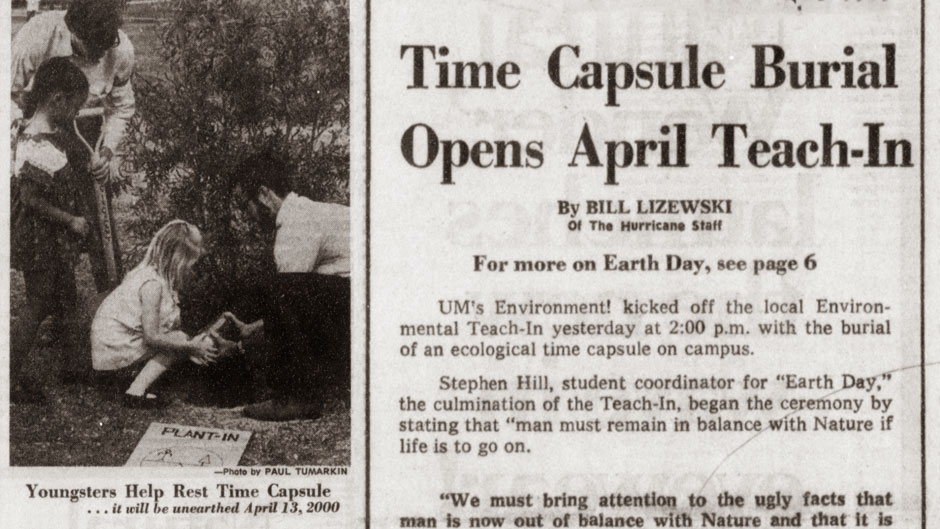Fifty years ago, on April 22, 1970, Dr. Henry King Stanford, the third University of Miami President, proclaimed the day as Earth Day at the University of Miami. “The time has come to make an inventory of our environmental situation, to see how serious the crisis is, and to see what can and should be done about it,” he stated.
Melissa Thomas, Hillary Keys, Gina Allen, and Ross McCluney took that call to action and buried a time capsule built by the College of Engineering at the University to mark the celebration. Included inside were samples of clean air, clean water, photographs of land replete with life and resources, and photographs of land made sterile. Five decades later, this group of environmental pioneers are being honored as the recipients of the Roberta “Bosey” Fulbright Foote Prize, which honors members of the University of Miami community who make a meaningful and lasting contribution to the beauty, humanity, and future of the campus.
“I was very surprised and touched to receive recognition from the University of Miami,” said Thomas. “I was honored to be part of the Earth Day ceremony as a 6-year-old, and it made a lifelong impression. But true credit goes to the University of Miami students of Environment! [a campus group], who organized that event and others.”
At the time, Thomas, Keys, and Allen were all children of University employees who were interested in the environment. And, McCluney was the president of Environment! Before many considered the environment as a pressing issue, this organization was leading the conversation and educating our community in support of environmental sustainability.
“We have been destroying the Earth in increasing amounts ever since the beginning of the industrial revolution,” explained McCluney. “The topics that we were advocating for then are just as relevant today. We’ve made progress along the way, and we’ve cut back on emissions. But there’s still more progress to be made.”
Given the symbolic nature of the 50th anniversary of the burial of the time capsule, the group embodies the characteristics of the Foote Prize.
“The award has made me reminisce,” said Keys. “I was only 5 years old when I buried the time capsule; and at the time, I probably had little awareness of the impact that this would make. And, it’s exciting to see how UM is continually staying committed to sustainability 50 years later.”
This rings true because the other recipient of this year’s Foote Prize has followed in their footsteps a half a century later.
Delaney Reynolds is a junior majoring in marine science and geology and minoring in climate policy.
“I am so incredibly honored to be a recipient of this prize. It always makes me happy when any sort of sustainability efforts at UM are highlighted,” said Reynolds. “To be able to share what we've been able to accomplish over the past few years on campus and in the community is very exciting to me.”
Reynolds currently serves as the vice chair of the Student Government ECO board and director of the University’s Green Committee.
“I plan to continue working with my friends in those organizations to make as much of an impact on campus as we can,” she said. “We are at the very real risk of losing unique habitats and environments all over the world if we don't solve this problem, and that's why sustainability is crucial to the future of our planet.”
Reynolds has amassed a variety of accomplishments in her academic career including, co-authoring and helping implement a first of its kind solar power mandate in the city of South Miami. She has also been named the 2019 Intern of the Year in the Shark Research and Conservation Program’s lab at the Rosenstiel School.
Off campus, Reynolds is having a profound impact on our community, country, and the world. She is the founder of The Sink or Swim Project, a nonprofit organization which has educated millions of people around the world on the risks we face from climate change. Recently, she was a speaker at this year’s Miami Climate Symposium and her sustainability work was featured in the current April 2020 issue of National Geographic magazine.
University of Miami President Julio Frenk believes Thomas, Keys, Allen, McCluney, and Reynolds all exemplify the ingenuity and vision Bosey Foote herself embodied.
“At a time when uncertainty and crisis grip the headlines, I am proud and honored that the stories of hope here at the U span our history and our future,” said Frenk.
Reynolds hopes to continue her efforts in making the world a better and healthier place to live and survive.
“I will fight for the well-being of our planet and educate others on the risks we face, as well as what we can do to help, until we no longer face them,” she said. “Wherever my future takes me, whether it's a track in policy, research, or both, I will continue to study our environmental challenges and share the knowledge that I gain with others so that we can all work together in creating the solutions we need.”
All the recipients said they will use the award to spread awareness in their community.
“Sustainability is more relevant than ever as time goes on, and we don’t pay enough attention to it,” said Allen. “The pandemic we are living in, oddly enough, shows how activity in one part of the globe affects everyone. One of the ideas I have discussed with my children is the idea that their generation can help change the trajectory of sustainability moving forward.”
“I’ll continue doing everything I can do to minimize my footprint and the footprint of my family,” said Keys. “I’m also looking for ways on how I can share this information to those who will help bring some awareness.”

